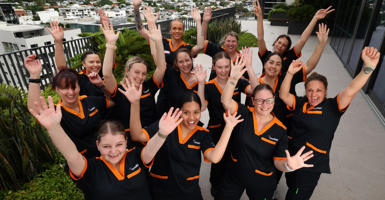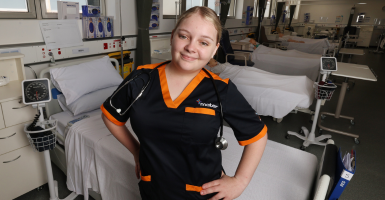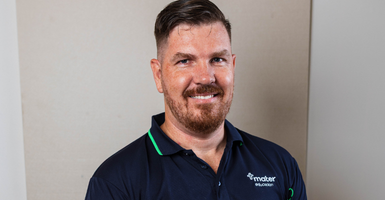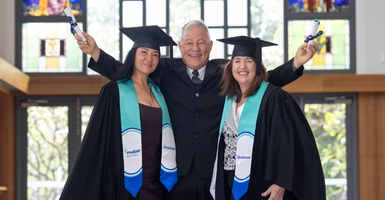Mater Education welcomes inaugural Simulation Fellows
After a competitive recruitment process, Dr Dominic Ormston (Anaesthetics) and Dr Richard Mausling (Newborn services) have been appointed as Mater Education’s inaugural Simulation Fellows, commencing this month.
The Simulation Fellowship Program is a joint initiative of Mater Health and Mater Education, funded by Mater Foundation, and is available exclusively to Mater clinicians.
The program has been designed to strengthen the use of innovative simulation training at Mater.
As part of their fellowships, Dr Ormston and Dr Mausling will complete a graduate certificate in education specialising in simulation through the Massachusetts General Hospital (MGH) Institute of Health Professions (IHP), thanks to a new teaching affiliation between Mater Education and MGH IHP. The affiliation allows them to undertake their required practical simulation training and assessment on campus at Mater Education.
Mater Education is also an Affiliate Partner of the internationally renowned Center for Medical Simulation (CMS) in Boston. Through this affiliation, Simulation Fellows will undertake CMS training at Mater, and will have the option to complete a residency program at CMS in Boston.
Dr Ormston said there were a number of reasons why Mater’s simulation fellowship program was so appealing.
“It’s a well-structured program. There’s a clear training curriculum which has been developed and run in partnership with the Center for Medical Simulation and their Harvard Medical School faculty, which is quite a big deal really. They’re one of two major schools of thought in simulation, so having such a close link with them is excellent. It means we get to do the course locally and don’t have to travel half way around the world to do it.
“The course is also funded which is excellent. It’s expensive to train in simulation and that can be a significant deterrent to many trainees,” he said.
Dr Ormston also saw the benefits of developing and delivering simulation courses on campus at Mater, within an active clinical environment.
“There’s often a very big divide between who’s on a simulation course and where they normally practice.
“Having it onsite means there’s scope to start to integrate simulation training into the actual work space, so we can practice crisis management and rare event management with people who work together in real life.”
Throughout his fellowship, Dr Ormston will work towards developing a series of simulation-based emergency response courses for the anaesthetics department at Mater, to help meet the ongoing training requirements of consultants. Dr Mausling hopes to develop a series of simulation-based training programs for registrars and nurses working in the neonatal critical care unit, to help improve the skills and confidence of early career clinicians.



